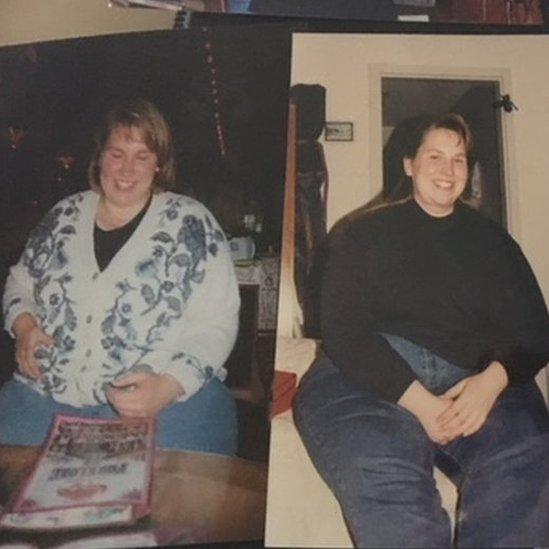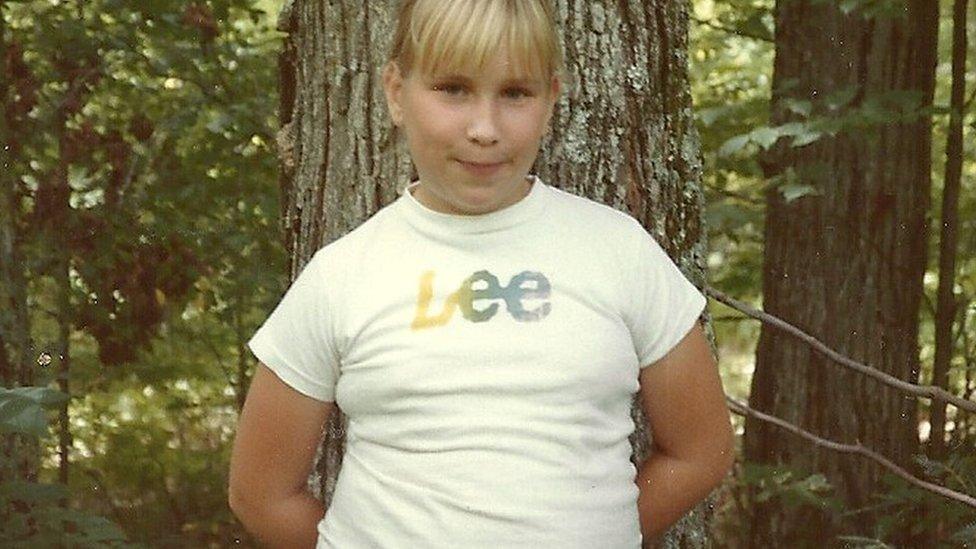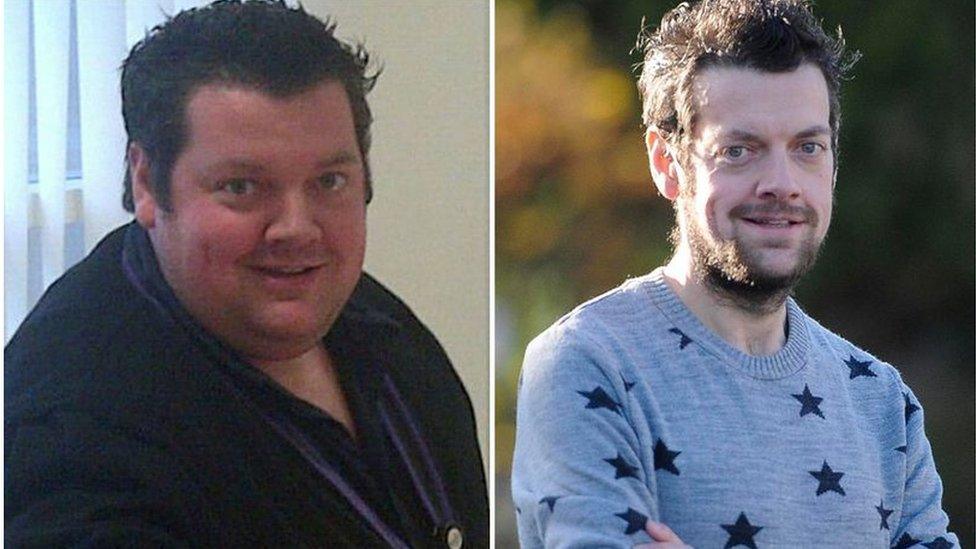'I'd binge on Nutella, eating a giant tub a week'
- Published

At her heaviest, Kara Richardson Whitely weighed more than 21 stone
Kara Richardson Whitely, 44, has struggled with Binge Eating Disorder (BED) and subsequent obesity for most of her life.
"I tried dieting numerous times but would always put the weight back on. I went to my doctor when I hit 21 stone and she said I should accept my weight. But I was really sick; I had arthritis in my knees and incontinence because of the pressure on my bladder.
"My trousers were so wide they would sag, exposing my underwear. My thighs rubbed together, wearing away the fabric of my jeans on my inner thighs.
"I was feeling so much guilt and shame about food. I would binge and then hide my overeating from my husband."
The stigma of obesity
Kara says she also suffered from the judgement of others. Once, she went into her daughter's school to read, and one of the children asked: 'Why is your mum so fat?''
"Everyone laughed and my daughter was mortified. I began to dread even leaving the house."
The turning point for Kara came when doctors finally recognised that she was suffering from a mental health condition, and that a simple dietary plan was not going to work.
"Having a name for what I was going through was a huge relief.
"I binged to push away anything bad. I ate to forget, and my eating was followed by overwhelming shame, guilt and embarrassment.

Kara started to gain weight as a child when her parents divorced
"Over time, therapy from a specialist in BED helped me to develop coping strategies."
The neglected eating disorder
Kara's experience is typical of sufferers of Binge Eating Disorder. The condition was only formally categorised in 2013, and even though it is far more common than anorexia or bulimia, awareness is still limited, and treatment scarce.

What is Binge Eating Disorder?
BED is defined as eating abnormal amounts of food - coupled with a feeling of loss of control, and then shame, guilt and anxiety afterwards.
Unlike those with bulimia, people with binge eating disorder do not regularly use purging methods after a binge.
Often (though not always) binge eating disorder can cause weight gain.
While binge eating disorder can affect anyone, the condition tends to be more common in adults than in younger people, often starting in middle age. It may develop from or into another eating disorder.
Source: BEAT

Prof Christopher Fairburn, director of the Centre for Research on Eating Disorders at Oxford University, says: "Much is still unknown about BED.
"We know that it affects a broad age range, about a third are men and two-thirds are women. It is associated with obesity, an American study found a third of obese people self-reported BED, but many with BED are also not overweight.
"It is very treatable. But in our experience when it comes to obese people the focus is on weight, and the emotional side of things tends to be neglected. There is a lot of stigma. People are assumed to be lazy and slovenly."
'They just assumed I was greedy'
Certainly this was the experience of Andy Butler, 35, who by the time he was 30 years old weighed 30 stone.

Andy Butler weighed 30 stone when he suffered from Binge Eating Disorder
"I was nearly dead. I couldn't walk more than a few feet. I went to see my GP who diagnosed Binge Eating Disorder and I was referred to eating disorder clinics.
"I was put in a group of anorexic women. They were dangerously thin and nearly dying, and I'm talking about how I can't stop eating. It was awful.
"They sent me to counsellors who would say things like, 'If you get the urge to binge, go for a walk or read a book', but once you've got that urge it's impossible to stop."
Andy decided to pay for a specialist counsellor in BED and over time, lost 8 stone. He then went on to have a gastric sleeve operation which cut down the size of his stomach by 80%. It was drastic, but now he's lost 16 stone.
"Above all that what really transformed things for me was being honest. Because I was male and overweight people would just assume I was greedy. They couldn't believe that I had an eating disorder."
Better treatment is needed
Gemma Gordon is working on a PhD at King's College London, investigating new treatment options for BED.
"The patients I've talked to feel quite disappointed with the reaction they've had from healthcare professionals.
"One patient with BED told me her doctor advised her to eat less and move more. She felt upset and disappointed which unfortunately led to another bingeing episode. There is clearly a need for greater awareness."
Rebecca Field, from the eating disorder charity Beat, agrees:
"Despite new NICE standards specifically stating that all people with binge eating disorder should receive appropriate psychological treatment, in many eating disorder services no such treatment is available.
"Often people with binge eating disorder will become obese because of their illness but although NICE guidelines say that weight loss is not the aim of therapy in itself, many people tell us they are referred to weight management services or even slimming clubs instead of therapy."
Kara Richardson Whitely opted for a gastric sleeve operation alongside her therapy. Now she has lost around 5 stone.
She says she now has a far healthier relationship with food.
"Whereas before I'd binge on Nutella, eating a giant tub weekly, now it's in my house but when I see it I don't have to eat it. I no longer dull down my emotions with food."

Kara has climbed Mount Kilimanjaro
She gives talks about BED around the US and abroad and has written a book, The Weight of Being, about her struggle with obesity.
Anyone worried about their own or someone else's health should contact the charity Beat, external.
Follow Laurel Ives on Twitter, external
- Published26 February 2018
